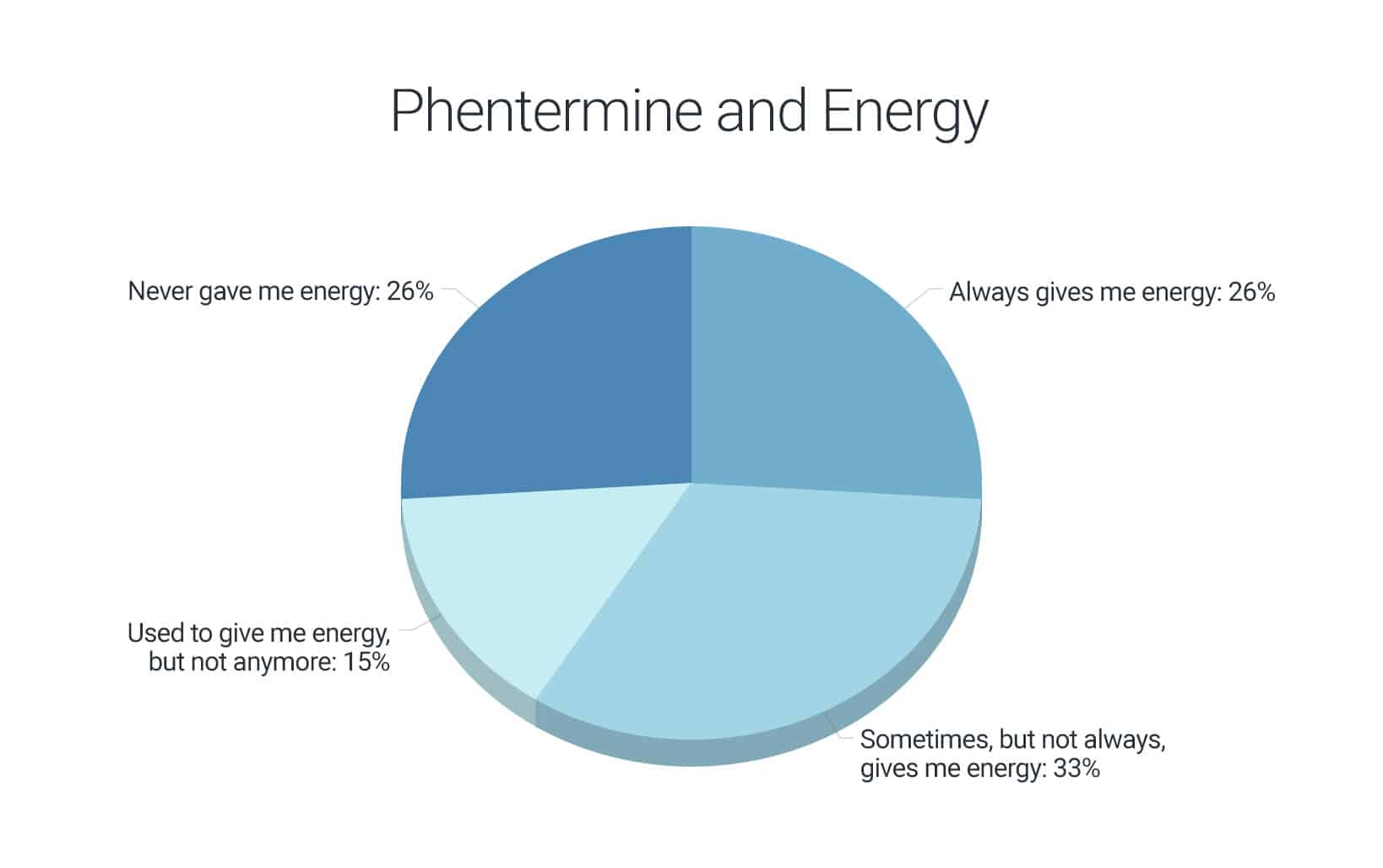How to Get More Energy from Phentermine
Phentermine famously increases energy, but for some users, this much-anticipated boost never comes or wears off only a few weeks into treatment.
If your phentermine stopped working and are now looking for other ways to increase energy, consider these dietary and lifestyle changes to give yourself a quick boost!
How Does Phentermine Give You Energy?

Phentermine works as a central nervous system stimulant. It boosts energy, amplifies feelings of alertness, and increases fat burn, while also suppressing appetite.
In the first couple of days, many patients feel “buzzed” or “wired” from phentermine. However, as the body adjusts to the medication, this sensation stops, and the constant energy boost becomes less noticeable.
Unfortunately, some users never experience any boost of energy from phentermine.
According to a recent online poll, about 60% of phentermine users always or sometimes experience an energy boost, while 26% say they have NEVER felt any extra energy from phentermine.

How long does the energy from phentermine last?
The duration of phentermine energy is different for each person.
Phentermine HCL is fully absorbed in 4-6 hours, but its effects last significantly longer (
For this reason, doctors and pharmacists recommend that patients take their last pill no later than 8-10 hours before bedtime. Taking this medication too late in the day increases the risk of phentermine insomnia.
10 Tips to Get More Energy Naturally

If phentermine doesn’t give you the boost you had hoped for, here are several habits that naturally increase energy levels:
1. Prioritize Sleep
Sleep is a simple but powerful solution to your energy crisis. With ever-busier schedules, it is common to cut a few hours of sleep out each week to make time for other activities. However, sleep deprivation can wreak havoc on your health, not to mention your energy levels.
Aim for 7-9 hours of sleep each night.
2. Get Moving
Most people skip the gym when energy is feeling low, but exercise is a great way to boost all-day energy.
Quick, intense workouts boost energy levels and fat loss. Interval training, also called HIIT or “burst training”, consists of quick intervals (30-60 seconds) of high-intensity exercise punctuated with slightly longer intervals (3-4 minutes) of lower-intensity work).
Not in the mood to break a sweat? Stretching increases circulation to provide the brain and body with much-needed oxygen and nutrients. Just a few minutes of easy stretching can noticeably increase energy levels (
3. Break It Up
Take short breaks throughout the day.
Researchers at the University of Illinois at Urbana-Champaign found that taking several short breaks improves focus and performance on extended tasks like studying for a test or finishing a project at work (
If you sit at a desk all day, try:
- Going to a restroom on another floor
- Standing up to refill your glass of water every hour, or
- Walking over to talk to a colleague face-to-face instead of sending an email.
These are all great ways to burn extra calories, stretch your legs, rest your eyes and clear your head for a few minutes.
4. Drink More Water
Even mild dehydration zaps energy, so drinking enough water is a must for keeping energy levels high. Research shows that just 1-2% of dehydration causes headaches, fatigue, and difficulty concentrating in women, and makes men feel more fatigued, tense, and anxious.
To combat dehydration-related fatigue, drink at least two liters (64 ounces) of water per day (
5. Prioritize Protein
Protein is an important energy source for weight loss.
It keeps you full longer than carbohydrates and helps build muscle. Plus, protein also helps prevent spikes and crashes in blood sugar so that you feel more energetic and less lethargic overall.
Eggs, chicken breast, fish, legumes, and low-fat dairy are all good sources of protein.

6. Plan Your Meals
Plan to eat three light, nutritious meals per day, plus 2-3 small snacks. Eating 5-6 times per day boosts energy because it keeps your body fueled and minimizes low blood sugars.
It’s also important to always eat breakfast. Many dieters skip their morning meal in hopes of saving a few hundred extra calories, but taking the time to prepare and eat a nutritious breakfast sets a healthy tone for the rest of the day.
7. Include Omega-3 Fatty Acids
Omega-3 fatty acids reduce inflammation, combat depression, and improve mood and memory – all of which positively affect energy levels.
Good food sources of omega-3 fatty acids include cold-water fish (e.g., salmon or tuna), walnuts, flaxseeds, leafy green vegetables, beans, and edamame.
8. Avoid Acidifying Foods
Urinary pH affects how much phentermine the body uses.
Under normal circumstances, about 30% phentermine is excreted without being metabolized. However, patients with an acidic urinary pH excrete double that (60%) unchanged in 48 hours. (
So, maintaining an alkaline (basic) urinary pH may help your body use phentermine more efficiently.
Increase your pH by eating more alkalizing foods (like fruit, vegetables, almonds & cinnamon) and minimizing acidifying foods and drinks (like alcohol, coffee, soda, butter, ice cream & candy).
9. Eliminate Caffeine
Regardless of energy levels, avoid coffee while taking phentermine, given the potential for a dangerous reaction between two stimulants.
However, cutting coffee helps boost energy levels long-term. This is because habitual caffeine consumption increases natural feelings of fatigue if the body becomes too reliant on the stimulant to provide energy.
10. Let Yourself Yawn
Yawning is not always socially acceptable, but it is your body’s natural energy boost.
When you open your mouth and inhale (as you do while yawning), it provides an extra boost of oxygen to increase alertness and energy. So, if you’re feeling low on energy, let yourself yawn!
Back to Phentermine Stopped Working
- PubChem. (n.d.). Phentermine.
- Dr. Rick, MD. (2012, April 02). Phentermine 37.5 mg/daily in moring. My question is how does…
- UC Davis Student Health and Counseling Services. (2014, April 29). Why Stretching is Extremely Important.
- Ariga, A., & Lleras, A. (2011). Brief and rare mental “breaks” keep you focused: Deactivation and reactivation of task goals preempt vigilance decrements. Cognition, 118(3), 439-443. doi:10.1016/j.cognition.2010.12.007
- Poitras, C. (2012, February 24). Even Mild Dehydration Can Alter Mood.
- National Center for Biotechnology Information: PubChem Compound Database. Phentermine.

